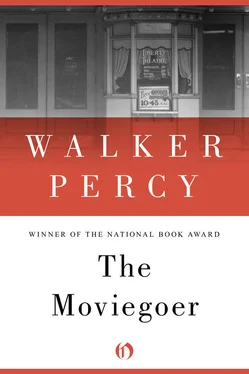Walker Percy - The Moviegoer
Здесь есть возможность читать онлайн «Walker Percy - The Moviegoer» весь текст электронной книги совершенно бесплатно (целиком полную версию без сокращений). В некоторых случаях можно слушать аудио, скачать через торрент в формате fb2 и присутствует краткое содержание. Год выпуска: 2011, Издательство: Open Road Media, Жанр: Современная проза, на английском языке. Описание произведения, (предисловие) а так же отзывы посетителей доступны на портале библиотеки ЛибКат.
- Название:The Moviegoer
- Автор:
- Издательство:Open Road Media
- Жанр:
- Год:2011
- ISBN:нет данных
- Рейтинг книги:5 / 5. Голосов: 1
-
Избранное:Добавить в избранное
- Отзывы:
-
Ваша оценка:
- 100
- 1
- 2
- 3
- 4
- 5
The Moviegoer: краткое содержание, описание и аннотация
Предлагаем к чтению аннотацию, описание, краткое содержание или предисловие (зависит от того, что написал сам автор книги «The Moviegoer»). Если вы не нашли необходимую информацию о книге — напишите в комментариях, мы постараемся отыскать её.
The Moviegoer — читать онлайн бесплатно полную книгу (весь текст) целиком
Ниже представлен текст книги, разбитый по страницам. Система сохранения места последней прочитанной страницы, позволяет с удобством читать онлайн бесплатно книгу «The Moviegoer», без необходимости каждый раз заново искать на чём Вы остановились. Поставьте закладку, и сможете в любой момент перейти на страницу, на которой закончили чтение.
Интервал:
Закладка:
“The Princess?”
There is a noise above us. I blink up into the thin sunlight. Bessie Coe — so called to distinguish her from Bessie Baham the laundress — a speckle-faced Negress with a white lip, leans out from the servants’ walk to shake a mop. Since she is kitchen help, she can allow herself to greet me in the old style. “Mist Binx,” she declares hoarsely, hollering it out over my head to the neighborhood in a burlesque of a greeting yet good-naturedly and even inviting me to join in the burlesque.
“She is seventy five years old, a little bitty dried-up old thing and next to Em the most charming, the wittiest and the wisest woman I ever knew. She has been of more service to us in the U.N. than the entire American delegation. Her place is always electric with excitement. Kate — who in my opinion is already a great lady — would find herself for the first time. The long and the short of it is she needs a companion. The very night I left New York she said to me: now you listen here — while you are in your American South, you make it your business to find me a nice Southern girl — you know the kind I have in mind. Of course the kind she had in mind is the Southerner who is so curiously like the old-style Russian gentry. I thought no more about it until last night as I watched Kate go up the steps. My God, I said, there goes Natasha Rostov. Have you ever noticed it?”
“Natasha?” I say blinking. “What has happened? Has something happened to Kate?”
“I am not sure what happened.” Sam places heel to toe and, holding his elbow in his hand and his arm straight up and down in front of him — himself gathered to a point, aimed — puffs a cigarette. “Certainly there was nothing wrong when Kate went to bed at two o’clock this morning. On the contrary. She was exalted. We had had, she and I and Em, four hours of the best talk I ever had anywhere. She was the most fascinating woman in New Orleans and she damn well knew it.”
(Aye, sweet Kate, and I know too. I know your old upside-down trick: when all is lost, when they despair of you, then it is, at this darkest hour, that you emerge as the gorgeous one.)
“Emily and I talked for a little while longer and went up to bed. It was not later than two thirty. At four o’clock something woke me. What it was I can’t for the life of me recall but I awoke with the most importunate sense of something wrong. I went into the hall. There was a light under Kate’s door but I heard nothing. So I went back to bed and slept until eight.” Sam speaks in a perfunctory voice, listing items rapidly and accurately in a professional style. “When Kate had not appeared for breakfast by ten o’clock, Emily sent Mercer up with a tray. Meanwhile Jules had left for church. Mercer knocked at Kate’s door and called out loudly enough to be heard downstairs and received no answer. Now Emily was visibly alarmed and asked me to come up with her. For ten minutes we knocked and called (do you know how very long ten minutes is?). So what the hell, I kicked the door down. Kate was in bed and deeply asleep, it seemed to me. But her breathing was quite shallow and there was a bottle of capsules open on the table. But it was by no means empty — I judge that it was just over one third filled. Anyhow, Emily could not wake her up. Whereupon she, Emily, became extremely agitated and asked me to call Dr Mink. By the time he arrived, of course, Kate had waked up and was lashing out with a particularly malevolent and drunken sort of violence. Toward Emily she exhibited a cold fury which was actually frightening. When she told us to get the hell out, I can assure you that I obeyed at once. Dr Mink lavaged her stomach and gave her a stimulant—” Sam looks at his watch, “—that was an hour ago. Now that fellow has pretty good nerve. He wouldn’t put her in the hospital which would have been the cagey thing to do. Emily asked him what he proposed to do. He said Kate had promised to see him Monday and that was good enough for him — and as for the pentobarbital, no one could really keep anybody else from swallowing any number any time he wanted to. He’s a great admirer of Suë, by the way. We did manage to get the bottle, however—”
“Sam!” My aunt’s voice, low and rich in overtones of meaning, comes down to us.
Sam looks down past his arm to see that his heel is aligned properly. I start up nervously, uneasy that Sam might have missed the warning in my aunt’s voice.
“One more thing. Oscar and Edna are here. Now wouldn’t you know they’d be? But perhaps it is just as well. For it is an awkward moment for Kate. The trick is for her to show herself. Here’s what we hit upon: you show up, knowing nothing, come looking for her and fetch her down to dinner.”
My aunt catches my eye from the dining room and I go in to kiss her and speak to the Oscar Bollings. Things seem calm enough. Uncle Jules is laughing with Aunt Edna about something. Though Aunt Emily is abstracted, temple propped on three fingers, she speaks cheerfully, and I can’t help but wonder if Sam’s story is not exaggerated. Uncle Oscar and Aunt Edna have come down from Feliciana Parish for Carnival and the Spring Pilgrimage, an annual tour of old houses and patios. Aunt Edna is a handsome stoutish woman with snapping black eyes and a near-mustache. Though she is at least sixty five, her hair is still black and loops back over her ears in a way that makes me think of “raven tresses.” Uncle Oscar is all dressed up, but you can tell he is countrified. The fourth of the elder Bolling brothers, he elected to be neither soldier nor lawyer nor doctor but storekeeper — that is, until his recent success in exhibiting Lynwood to tourists at a dollar a head. In certain quirks of expression and waggings of head, he is startlingly like Judge Anse, but there is a flattening of the nosebridge and a softening of the forehead and a giddy light-blue amiability about the eyes. Upon the death of the brothers and the emigration of the girls, Uncle Oscar and Aunt Edna fell heir to the old place. It is not much of a showplace, to be honest (it never occurred to anyone to give it a name until Aunt Edna thought of Lynwood), being a big old rambling pile and having no special virtue save only its deep verandas and its avenue of oaks. But Uncle Oscar and Aunt Edna managed to fix it up wonderfully well and even win a permanent place on the Azalea Trail. Strangely enough, it was not Uncle Oscar, the old settler, who restored the house in the best Natchez style — adding a covered walk to the outkitchen, serving mint juleps where the Bollings had never drunk anything but toddies, and even dressing up poor old Shad in a Seagram’s butler suit and putting him out on the highway with a dinner bell — it was not Uncle Oscar but Aunt Edna, the druggist’s daughter from upstate New York whom Uncle Oscar met and married while she was training at Plattsburg in the first world war.
When I bend to kiss her, my aunt gives me no sign whatever, beyond her usual gray look and the usual two quick pats on the cheek — no sign, unless it is a certain depth of irony, a gray under gray.
There comes to me in the ascent a brief annunciatory syllable in the throat stopped in the scrape of a chair as if, having signaled me and repenting of it, it had then to pass itself off as but one of the small day noises of the house. Off the landing is a dark little mezzanine arranged as a room of furniture. It is a place one passes twenty times a day and no more thinks of entering than of entering a picture, nor even of looking at, but having entered, enters with all the oddness of entering a picture, a tableau in depth wherein space is untenanted and wherefrom the view of the house, the hall and dining room below, seems at once privileged and strange. Kate is there in the shadows. She sits beside the porcelain fireplace with its glassed-in cases of medals and tufted Bohemian slippers and gold-encrusted crystal and the ambrotype of Captain Alex Bolling of the 2nd Louisiana Infantry not merely locked in but sealed in forever by glass set into the wall, an immurement which used to provoke in me the liveliest speculation by virtue of its very permanence — to think of the little objects closeted away forever in the same sequestered air of 1938—Kate sits, herself exempt from the needs and necessaries of all passers-by, and holds her arms in her hands and cheerfully makes room for me in the love seat. Not until later do I think why it is she looks so well: she is all dressed up, for the first time since Christmas. It is the scent of her perfume, her nylon-whispering legs, the white dress against her dark skin, a proper dress fluted and flounced and now gathered by her and folded away from me.
Читать дальшеИнтервал:
Закладка:
Похожие книги на «The Moviegoer»
Представляем Вашему вниманию похожие книги на «The Moviegoer» списком для выбора. Мы отобрали схожую по названию и смыслу литературу в надежде предоставить читателям больше вариантов отыскать новые, интересные, ещё непрочитанные произведения.
Обсуждение, отзывы о книге «The Moviegoer» и просто собственные мнения читателей. Оставьте ваши комментарии, напишите, что Вы думаете о произведении, его смысле или главных героях. Укажите что конкретно понравилось, а что нет, и почему Вы так считаете.












